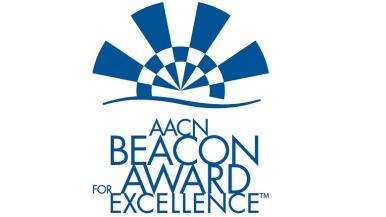Rush University Medical Center’s adult intensive care unit has received a gold level Beacon Award for Excellence from the American Association of Critical-Care Nurses. This award honors excellence in intensive care nursing and is regarded as the top honor in the field.
Beacon awards are given at three levels, gold, silver and bronze. The gold-level award signifies excellent and sustained unit performance and patient outcomes.
The adult intensive care unit, or AICU, received its Beacon award in late July, joining seven other Rush University System for Health ICUs in achieving Beacon status. Rush Oak Park Hospital has earned a gold level designation for its ICU, and Rush Copley Medical Center has received a gold level designation for its ICU and a silver level designation for its intermediate care unit.
Rush University Medical Center’s cardioscience ICU and neonatal ICU received gold and silver level Beacon awards, respectively, in May and April, and the pediatric ICU and neuroscience ICU have been given silver-level designations. The Medical Center’s NICU and PICU are the only units of their kind in Illinois to earn Beacon honors.
“In receiving this well-earned honor, the Medical Center’s adult intensive care unit shows why the nursing profession looks to Rush nurses and nurse leaders to advance the nursing profession by setting standards of practice, excellence and innovation in developing evidence-based care,” said Angelique Richard, PhD, RN, senior vice president of hospital operations for Rush University Medical Center and chief nursing officer for the Medical Center and the Rush system. “Achieving Beacon designation — excellence in critical care nursing — across so much of the Rush system is one example of this leadership, and I am very proud of the AICU and all our Beacon units.”
Beacon awards recognize unit caregivers who successfully improve patient outcomes and align practices with the AACN’s six Healthy Work Environment Standards. Units that achieve this three-year award meet national criteria consistent with Magnet recognition — which all three Rush System hospitals have received — the Malcolm Baldrige National Quality Award and the National Quality Healthcare Award.
Receiving this award also shows that effective policies, procedures and processes are inclusive and engage the multidisciplinary unit teams and key stakeholders. The AICU and other honored Rush System ICUs earned their Beacon awards by meeting the following criteria:
- Leadership structures and systems
- Appropriate staffing and staff engagement
- Effective communication, knowledge management and learning and development
- Evidence-based practice and processes
- Outcome measurement
“The Beacon award recognizes the exemplary care we provide our patients day in and day out,” said Beth Day, MSN, APRN, clinical nurse specialist, who co-wrote the AICU’s Beacon application.
“The designation says we have consistently high outcomes for patient care and that those outcomes are not a fluke, they’re not an accident,” added Gia Crisanti, MSN, RN, unit director of the AICU.
Day and Crisanti cited several examples of the outcomes that contributed to receiving gold Beacon recognition. The AICU went more than six years without a patient developing a catheter-associated urinary tract infection (aka CAUTI) during their admission. The unit also demonstrated key outcomes regarding fall reduction, with a 60% decrease in incidence from fiscal year 2017 through 2020 and no falls with injury in FY20.
“We continually analyzed our data and identified opportunities to for intervene, and over time we saw significant improvement,” Day said.
The AICU’s emphasis on collaboration among clinical care providers is also a particular strength. Physicians, nurses, residents and support staff meet regularly to identify ways to improve patient care.
“Communication is one of the big drivers of the patient experience and one of the strongest components of our team,” Day said. “Physicians listen to what the nursing staff have to say and partner with them on decision-making and the overall care of the patients. The nurses’ assessment is valued and utilized in making care decisions.”
Added Crisanti: “It reflects the cohesiveness of the team and the sheer desire to meet our patients’ needs and provide excellent care for the patient. “That’s why we’re here, for our patients to go home better than when they came in.”




